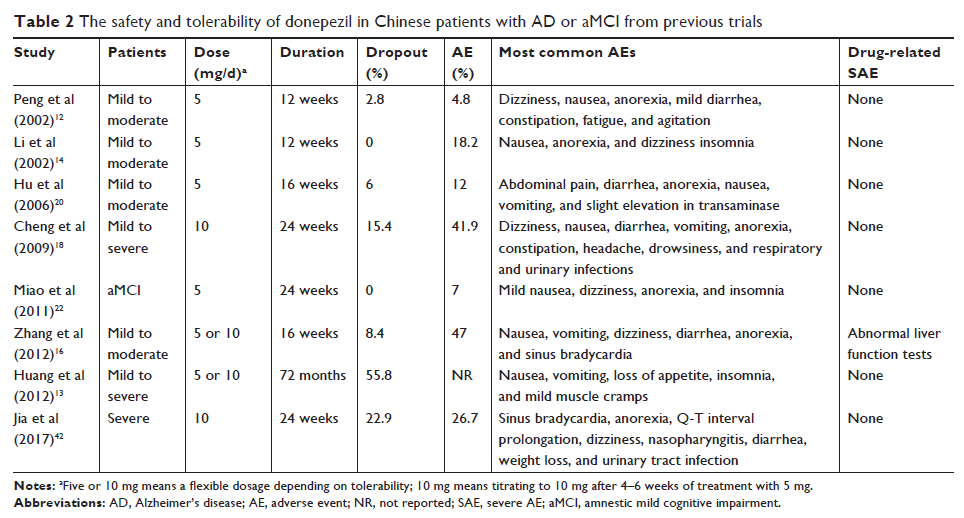108605
论文已发表
注册即可获取德孚的最新动态
IF 收录期刊
- 3.4 Breast Cancer (Dove Med Press)
- 3.2 Clin Epidemiol
- 2.6 Cancer Manag Res
- 2.9 Infect Drug Resist
- 3.7 Clin Interv Aging
- 5.1 Drug Des Dev Ther
- 3.1 Int J Chronic Obstr
- 6.6 Int J Nanomed
- 2.6 Int J Women's Health
- 2.9 Neuropsych Dis Treat
- 2.8 OncoTargets Ther
- 2.0 Patient Prefer Adher
- 2.2 Ther Clin Risk Manag
- 2.5 J Pain Res
- 3.0 Diabet Metab Synd Ob
- 3.2 Psychol Res Behav Ma
- 3.4 Nat Sci Sleep
- 1.8 Pharmgenomics Pers Med
- 2.0 Risk Manag Healthc Policy
- 4.1 J Inflamm Res
- 2.0 Int J Gen Med
- 3.4 J Hepatocell Carcinoma
- 3.0 J Asthma Allergy
- 2.2 Clin Cosmet Investig Dermatol
- 2.4 J Multidiscip Healthc

多奈哌齐治疗中国人阿尔茨海默病的临床疗效和安全性
Authors Zhang N, Gordon ML
Received 8 August 2018
Accepted for publication 14 September 2018
Published 11 October 2018 Volume 2018:13 Pages 1963—1970
DOI https://doi.org/10.2147/CIA.S159920
Checked for plagiarism Yes
Review by Single-blind
Peer reviewers approved by Dr Colin Mak
Peer reviewer comments 2
Editor who approved publication: Dr Wu
Abstract: Donepezil, an acetylcholinesterase inhibitor (AChEI), has been widely
used to treat Alzheimer’s disease (AD) in China. However, there are few studies
focusing on the efficacy and safety of donepezil in Chinese patients. In this
review, we discuss 1) the efficacy of donepezil and its comparison with other
AChEIs or memantine, 2) the therapeutic responses to donepezil and its
influencing factors, and 3) the safety and tolerability of donepezil in Chinese
patients with different stages of AD and amnestic mild cognitive impairment,
and further compare the similarities and differences of the results between
Chinese studies and previous Western studies that predominantly enrolled
Caucasian subjects. We include Chinese clinical trials and other well-designed
studies investigating donepezil or using donepezil as a positive control, in
which the efficacy and/or safety of donepezil have been analyzed. Based on
these studies, donepezil has been shown to be effective and safe in Chinese AD
patients and may impact AD biomarkers, such as hippocampal atrophy, Aβ, and
tau. In addition, the therapeutic response to donepezil may be influenced by
apolipoprotein E or cytochrome P450 2D6 polymorphism.
Keywords: Alzheimer’s disease, amnestic mild cognitive impairment, donepezil,
acetylcholinesterase inhibitor, efficacy, safety
